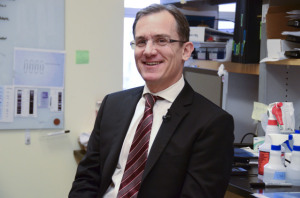by
Lauren Dubinsky, Senior Reporter | April 16, 2015
Genomic studies are an important part of precision medicine put they are only a piece of the puzzle. Dr. Mark A. Rubin, director of the Institute for Precision Medicine at Weill Cornell Medical College and NewYork-Presbyterian Hospital, believes that big data is also essential to tailor treatments to individuals.
He believes that searchable databases should be created that collect information from different medical centers so researchers and clinicians can spot trends in cancer across a large patient population. DOTmed News had the opportunity to speak with him about big data’s role in precision medicine and whether the industry will make progress with this in the near future.
DOTmed News: What role should big data play in precision medicine?



Ad Statistics
Times Displayed: 174397
Times Visited: 3179 For those who need to move fast and expand clinical capabilities -- and would love new equipment -- the uCT 550 Advance offers a new fully configured 80-slice CT in up to 2 weeks with routine maintenance and parts and Software Upgrades for Life™ included.
Dr. Mark A. Rubin: We need to harness all the data that is associated with the patients care. This includes information about family history and blood pressure but it also must include genomic testing data.
This “big data” may tell us about that status of 20,000 genes, most of it will not be of immediate use today. However, the payoff in managing this data during the course of a patient’s care is that as we learn new scientific information, we can keep going back to their personal “Wikipedia” and question is there anything they need to know for their health care.
Big Data should become part of the patients health care record. It also needs to be easily accessible, readable, and presented in a context that a caring doctor can understand.
DOTmed News: What do you think needs to be done to make big data a bigger part of precision medicine?
MAR: There is an up-front cultural change. We are working hard at Weill Cornell Medical College and NewYork-Presbyterian to create a passage for big data to enter seamlessly into the electronic medical record.
Achieving in hospitals across the nation in a way that protects patient’s privacy will also allow us access to compare our patient to 100s or 1,000s of patients with similar conditions. Developing a ‘Precision Medicine Wikipedia’ will make caring for patients more effective.
DOTmed News: Do you think the industry will make progress with that in the next five years or will it take longer than that?
MAR: I am confident that we will see real changes before then. It is in the health care industry’s best interest to facilitate a more efficient system. In the United States we outspend all European countries per person. Rethinking a more effective way to treat patients is critical. I am happy that President Obama highlighted this initiative in his State of the Union address.
Back to HCB News

